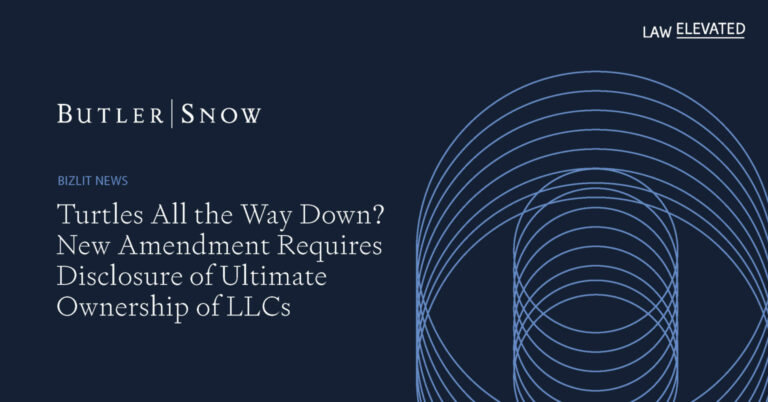Whether representing a plaintiff determining where to file a lawsuit or a defendant evaluating whether it can remove a state action to federal court, lawyers are often tasked with determining the citizenship of a party that is an LLC. In many instances, such an evaluation requires information beyond the lawyer’s reach, and often, identifying an LLC’s immediate owner leaves the attorney no better off than before, if that owner is simply another LLC. It is not uncommon for lawyers to discover layer after layer of LLC ownership before discovering who the ultimate, individual owners are.[1]
As we have previously discussed, see Agreement Isn’t Enough: The Fifth Circuit Examines Diversity Jurisdiction Sua Sponte – Butler Snow, federal courts take the requirements of 28 U.S.C. § 1332 seriously. As the Fifth Circuit has observed, “Because federal courts have limited jurisdiction, parties must make ‘clear, distinct, and precise affirmative jurisdictional allegations’ in their pleadings.” MidCap Media Fin., L.L.C. v. Pathway Data, Inc., 929 F.3d 310, 313 (5th Cir. 2019) (internal citation omitted). This makes the information asymmetry described above particularly problematic for parties seeking to establish federal diversity jurisdiction.
A new amendment to Federal Rule of Civil Procedure 7.1, set to go into effect December 2022, seeks to remedy this problem. It provides as follows:
In an action in which jurisdiction is based on diversity under 28 U.S.C. § 1332(a), a party or intervenor must, unless the court orders otherwise, file a disclosure statement. The statement must name—and identify the citizenship of—every individual or entity whose citizenship is attributed to that party or intervenor: (A) when the action is filed in or removed to federal court, and (B) when any later event occurs that could affect the court’s jurisdiction under § 1332(a).
https://www.uscourts.gov/sites/default/files/scotus_package_2021_final_0.pdf
While this new disclosure requirement should prevent the problem presented in MidCap, it does not, on its face, help a plaintiff seeking to establish diversity jurisdiction in a complaint filed against an LLC. With that said, the Committee Note to the revised rule assumes that “[p]leading on information and belief is acceptable at the pleading stage.” This is a position that has previously divided courts within the Fifth Circuit. See Rollins v. Fitts, 1:18-CV-198-GHD-DAS, 2019 WL 138166, at *2 (N.D. Miss. Jan. 8, 2019) (permitting); Hise Real Est. Investments, LP v. Great Lakes Ins. SE, 4:20-CV-820-SDJ, 2021 WL 217264, at *3 (E.D. Tex. Jan. 21, 2021) (permitting); Sanchez v. Aburto, No. 3:18-CV-2460, 2018 WL 4953147, at *2 (N.D. Tex. Oct. 12, 2018) (not permitting); Pennie v. Obama, 255 F.Supp.3d 648, 671 (N.D. Tex. 2017) (not permitting).
While the Fifth Circuit has not yet provided clear guidance on the permissibility of this pleading practice, for now, the amendments to Rule 7.1 are a step in the right direction for parties seeking to establish diversity jurisdiction.
[1] Some corporate litigants no doubt are loathe to disclose LLC ownership to this extent. Nevertheless, disclosure of the name and citizenship of every individual or entity whose citizenship is attributed to the party is now required. The wisdom and potential effects of requiring this level of disclosure are beyond the scope of this blog post.
